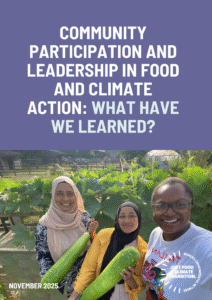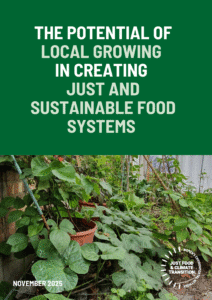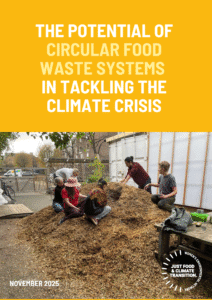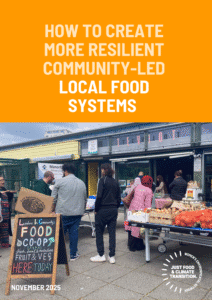Community participation and leadership in food and climate action
This report shares our collective learning about community participation and leadership in the Just Food and Climate Transition Programme (Just FACT) programme. We hope it can be a useful resource for people who are interested in building community power and participation, and exploring different models of leadership.
In this report we explore why it’s important for communities to lead action for a fairer food system, and what this looks like in practice. We share our learnings on what makes effective community outreach, and what enables people to stay involved in projects. Different partners had different perspectives and approaches to community leadership within the Just FACT programme, so we share a range of examples, reflecting on the pros and cons of different approaches. We also explore the impact of having local people employed on projects.
DOWNLOAD HERE
Summary of key learnings
How to reach communities and overcome barriers:
- Meet people in places they already go like schools, community spaces, health centres.
- Understand what would make a project accessible, by talking with communities
- Offer activities that resonate with people’s interests
- Be willing to try different approaches – no one size fits all.
- Ring fence budget to overcome financial barriers to participation
- Create spaces specifically for marginalised communities to come together
How to sustain participation and build community power
- Plan in time and resource for relationship building and value care and solidarity
- Shape project design with community members and make decisions together
- Support local people into paid organising and leadership roles
- Encourage the sharing of the existing knowledge and expertise
- Share power and responsibility through providing funding and resources
Models of community leadership that have been tested in Just FACT
- Initiator models: Staff collaborate with community members and gradually hand over stewardship of space and resources.
- Community organising models: Members collaborate as a non-hierarchical group to take collective action on an issue.
- Employment models: People from the local community are employed on projects
- Resource delegation models: Community representatives make decisions about where funding goes
Contents
- Introduction
- Summary of learning
- Context
- Why communities need to lead action for a fairer food system
- How to build community power and participation
- Community outreach and making first connections
- Responding to the exclusions communities face in getting involved
- Building relationships
- Making decisions together and building power
- Employing people from local communities in food and climate projects
- Our learning about models of community leadership
- Initiator models of leadership
- Community organising models
- Employment models of leadership
- Resource delegation models of leadership




